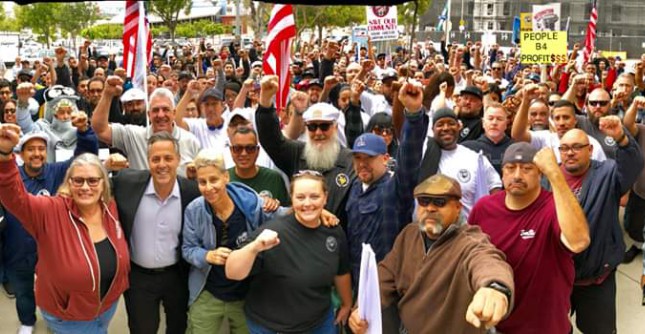Meanwhile, a state legislator wants the California Lands Commission to review port automation projects.
In the wake of a decision by the Port of Los Angeles Board of Harbor Commissioners to affirm the granting of a coast development permit to APM Terminals (APMT) for work it plans to do at its Pier 400 container terminal, local government officials are trying to get the decision reversed or reviewed.
The executive director of the Port of LA in January granted a permit that would allow APMT to install landside infrastructure to operate battery-electric-powered equipment.
While the Level 1 permit was seen by some as routine, the International Longshore and Warehouse Union saw it as a wolf in sheep’s clothing. It appealed the decision because APMT said it eventually plans to use unmanned straddle carriers at Pier 400. The union said that would result in job losses. In a 3-2 vote, the harbor commissioners turned down the appeal.
Los Angeles City Councilman Joe Buscaino (pictured above with ILWU members and supporters) said that he would assert the City Council’s jurisdiction over the commission’s decision to grant the approval and “bring it before the full council for a vote.”
A spokesman for Buscaino said the permit will be discussed at a Los Angeles City Council meeting Friday morning and predicted the council “will vote to veto the harbor commission.”
He added that public comment will be accepted at the meeting and that “we are expecting over 1,000 longshoremen and women to attend the meeting.”
Similar crowds of ILWU members and their supporters showed up at several meetings at which the commissioners considered the union’s appeal but eventually upheld the decision to grant the permit.
In a letter, APM Terminals, an affiliate of Maersk, told Buscaino that his motion “suggests that APMT requires the permit for automation at Pier 400. This is simply incorrect. APMT has the undisputed right under its lease and its collective bargaining agreement to introduce automated technology of this sort and does not require any permit or any other port, city or state approval to operate automated, driverless trucks. Additionally, APMT already possesses the technology and capability to operate this type of equipment at Pier 400.
“Therefore, the only thing the council would accomplish with a potential veto would be to block the introduction of battery-powered, zero- or near zero-emissions equipment that will advance the clean air goals that the city of Los Angeles has prioritized and that APMT is committed to meet,” says the letter from Wim Lagaay, chairman of APM Terminals Pacific, and Lee Kindberg, the director of environment and sustainability at Maersk.
APM Terminals said the permit granted “allows for minor infrastructure improvements that will enable APM Terminals to modernize Pier 400 with environmentally progressive zero-emissions and near-zero-emissions yard equipment.”
Meanwhile, California Assemblyman Mike Gipson, whose district includes the area adjacent to the port, has introduced a bill, AB1321, that would authorize the State Lands Commission “to approve, on a case-by-case basis, the use of automated technology, as defined, on the property of coastal ports within the commission’s jurisdiction when the commission determines that the proposed transition to the use of automated technology will provide a safe working environment and not cause critical damage to the state economy or to the economies of surrounding local communities, as specified.”
A summary of the bill explains, “The three members of the commission are the lieutenant governor, the controller and the director of finance. Existing law specifies that the commission has exclusive jurisdiction over all ungranted tidelands and submerged lands owned by the state and of the beds of navigable rivers, streams, lakes, bays, estuaries, inlets and straits, including tidelands and submerged lands or any interest in those lands, as described, which have been or may be acquired by the state by quitclaim, cession, grant, contract, otherwise from the federal government or by any other means. Existing law also provides specific responsibilities for the commission with respect to the ports of Los Angeles and Oakland.”
John McLaurin, the president of the Pacific Merchant Shipping Association, a trade organization that represents the shipping industry, said Gipson’s bill amounts to “creating a de facto statewide port authority.”
The Pacific Maritime Association (PMA), the group that represents employers during contract talks with the ILWU, said the decision by the Board of Harbor Commissioners to uphold the permit complied with the Port of Los Angeles’ master plan and would enable Pier 400 “to modernize in order to stem the troubling loss of market share at the Port of Los Angeles and create one of the greenest terminals in the world.”
It added that if the City Council overturns that decision, it “would send a damaging message regarding the city’s commitment to environmental leadership and the continuing competitiveness of the Port of Los Angeles.”
In response to Gipson’s bill, PMA said “AB 1321 threatens to drive tens of thousands of valuable trade-related jobs out of California and harm the very workers it is intended to help. California’s ports are critical engines of the state’s economy, but are losing market share in the competitive maritime industry at an alarming rate. Terminal automation, which is explicitly authorized by the collective bargaining agreement between the ILWU and PMA, is critically needed to empower port terminals to remain economically competitive while achieving ambitious clean air goals designed to protect port communities.”
“To help longshore workers prepare for the port jobs of the future, PMA has proposed a comprehensive training program that will re-skill ILUW longshoremen to be journeyman mechanics and provide up-skill training to current ILWU mechanics – enabling workers to take full advantage of new work opportunities on the waterfront. This re-skilling and up-skilling program directly reflects the priorities and objectives Gov. Newsom has presented for the state’s Future of Work Commission,” the PMA said.










